

30: Rewriting. 29: Finish Everything. As we all approach the end of NaNoWriMo, you may be thinking, “Well, I might not ever finish this sucker, but at least I got my 50,000 words done.
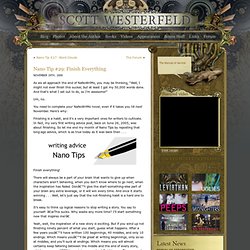
Nano Tip #27: Word Clouds « westerblog. It’s my second last NaNoWriMo post!
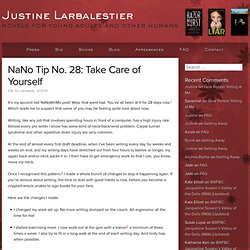
Wow, that went fast. You’ve all been at it for 28 days now. Which leads me to suspect that some of you may be feeling quite sore about now. 27: Word Clouds. We all have words we love too much. Maybe for you it’s something fancy, like “effulgent” or “apodictic,” or something sillier, like “smellypants.” And because we love these words, we will use them too often, until our readers begin to snicker quietly at us. But those big, obvious words are easy to spot. NaNo Tips No. 26: Giving Thanks. Only four more days of NaNoWriMo to go, and I’m noticing that a lot of people are beating up on themselves.
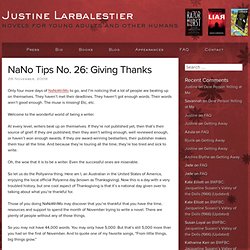
They haven’t met their deadlines. They haven’t got enough words. Their words aren’t good enough. The muse is missing! Etc, etc. Welcome to the wonderful world of being a writer. At every level, writers beat up on themselves. Oh, the woe that it is to be a writer. 25: Read It Backwards. This is my ante-penultimate Nano Tip, so you must be nearing the end of your fantabulous NaNoWriMo novel.
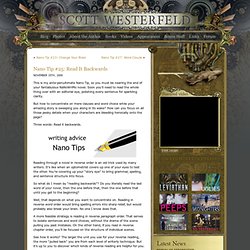
Soon you’ll need to read the whole thing over with an editorial eye, polishing every sentence for sparkling clarity. But how to concentrate on mere clauses and word choice while your amazing story is sweeping you along in its wake? 24: Writing While White. Lately many white writers have been asking me about writing characters who aren’t white.
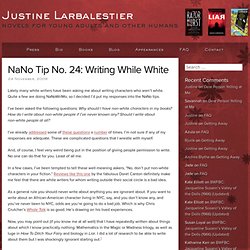
Quite a few are doing NaNoWriMo, so I decided I’d put my responses into the NaNo tips. I’ve been asked the following questions: Why should I have non-white characters in my books? 23: Change Your Brain. So . . . you’re more than two-thirds done with NaNoWriMo, and maybe you’re starting to crumple a bit.
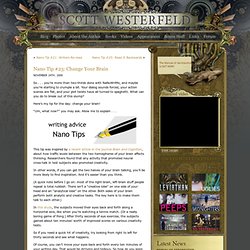
Your dialog sounds forced, your action scenes are flat, and your plot twists have all turned to spaghetti. What can you do to break out of this slump? Here’s my tip for the day: change your brain! “Um, what now?” 22: Read Bad Books. Yesterday Scott talked about the importance of rereading books you love to figure out how the writer made you react the way you did.
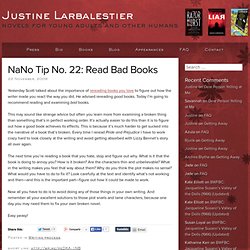
He advised rereading good books. Today I’m going to recommend reading and examining bad books. This may sound like strange advice but often you learn more from examining a broken thing than something that’s in perfect working order. It’s actually easier to do this than it is to figure out how a good book achieves its effects. 21: Writers Re-read. Being a writer should change your daily life.
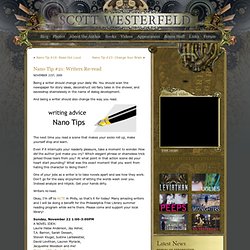
You should scan the newspaper for story ideas, deconstruct old fairy tales in the shower, and eavesdrop shamelessly in the name of dialog development. And being a writer should also change the way you read. The next time you read a scene that makes your socks roll up, make yourself stop and learn. 20: Don’t Wait for the Muse to Strike. It’s day twenty and I’ve seen some talk on NaNoNoWriMo blogs of muses showing up or, more often, not.
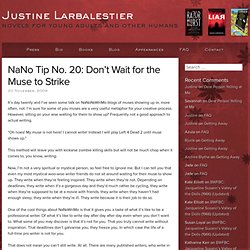
I’m sure for some of you muses are a very useful metaphor for your creative process. However, sitting on your arse waiting for them to show up? Frequently not a good approach to actual writing. “Oh noes! 19: Read Out Loud. If you ever take a linguistics class, you will hear this catechism from the first day on: 1) Speech is primary. 2) Speech is universal among human cultures, and separates us from other animals. 3) Speech is innately acquired-–-unlike writing, which is a skill that must be learned. 4) Therefore speech (not writing) is the primary material for linguistic study.
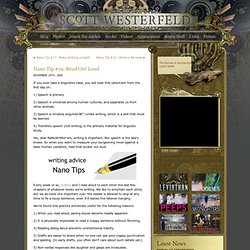
18: Breaking with Stereotypes. Yesterday’s post led to Kilks suggesting that I base a NaNo tip on it, which I am now doing. One of the biggest flaws in beginner writing is a reliance on stereotypes and cliches which produces characters who never come to life because they lack verisimilitude. The female protag faints and is afraid of spiders. The male one is brave and strong. Or vice versa. And that’s all there is to them. What do I mean by a stereotype? 17: Make Writing a Habit. One of your brain’s jobs is to turn frequent actions into habits. If you force yourself to turn the lights off every time you leave a room, it eventually becomes automatic. 16: Edit as You Go. 15: Take a Day Off. 14: Procrastination can be Your Friend.
13: Pace Charts. 12: Turn the Internet off. It’s day 12 and on the NaNoWriMo blogs there’s much talk of word counts missed, scenes not written, and of generally falling behind. 11: Passages of Disbelief. 10: Don’t Skip the Tricky Bits. I hope you all saw Scott’s tip yesterday, the first of a series on meta-documents. Though now that I use Scrivener, I no longer use meta-documents.
Or, rather, I do but they’re all incorporated into the one Scrivener document so it doesn’t feel like lots of different documents. But I digress: on to today’s tip which has nothing to do with meta-documents and also kind of contradicts my previous tip about using square brackets. It emerges from a conversation I had with the marvellous Sarah Rees Brennan. It turns out that she does not skip the boring or tricky bits but instead bribes herself into writing them. There are many reasons for doing this but the most frequently cited one is that if you skip all the hard bits—as I advised you to do in the square bracket post—you may never finish the book. It means I write all the easy parts of the book first, meaning I have to write all the hard parts later in a single chunk, meaning I probably won’t finish the book. 9: Meta-Documents. 8: Square Brackets. NaNo Tip no. 6: Emergency Unstucking Techniques. Just got back from a wonderful mini-tour in Canada. NaNo Tip no. 6: Emergency Unstucking Techniques.
One of the most frequent complaints I’m hearing from those down the NaNoWriMo word mines is that they keep getting stuck. As it happens I have already written a post on how to get unstuck. It is rather lengthy, however, so here’s a quick and dirty version of what you should do when you get stuck: 5: Write Your Way Out. NaNo Tip no. 4: Word Count is Not Everything. 3: Dialog Spine Analysis. 2: The Zen of First (Zero) Drafts.
1: Dialog Spine.